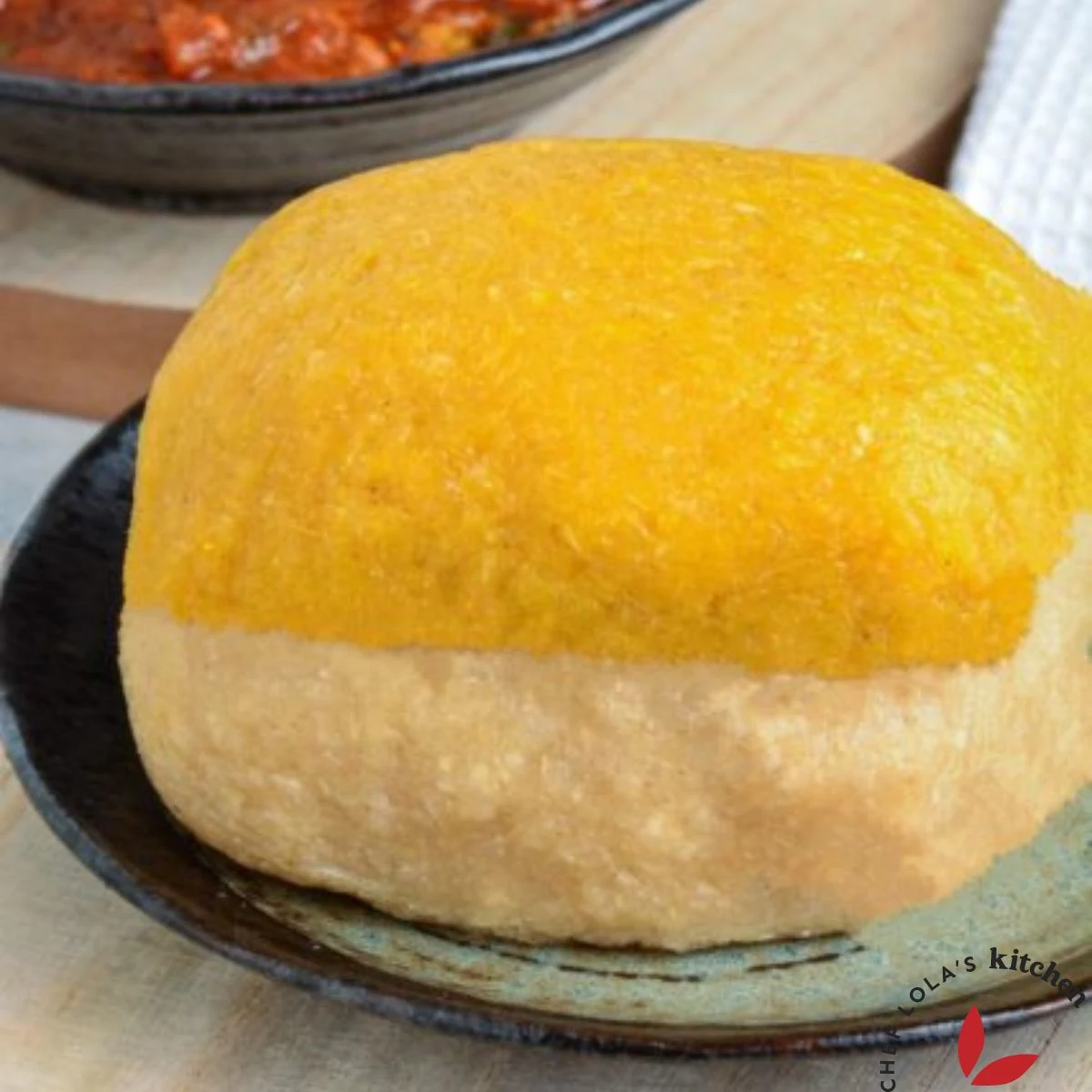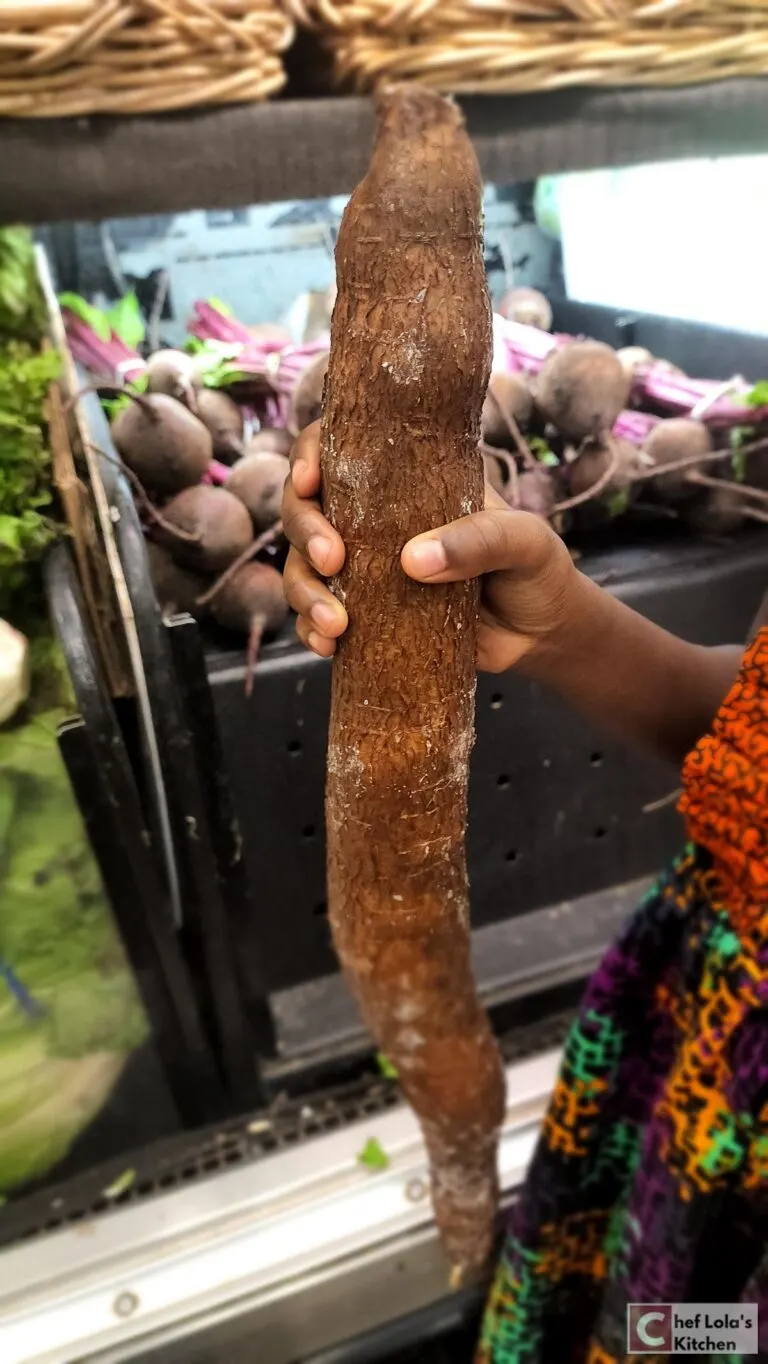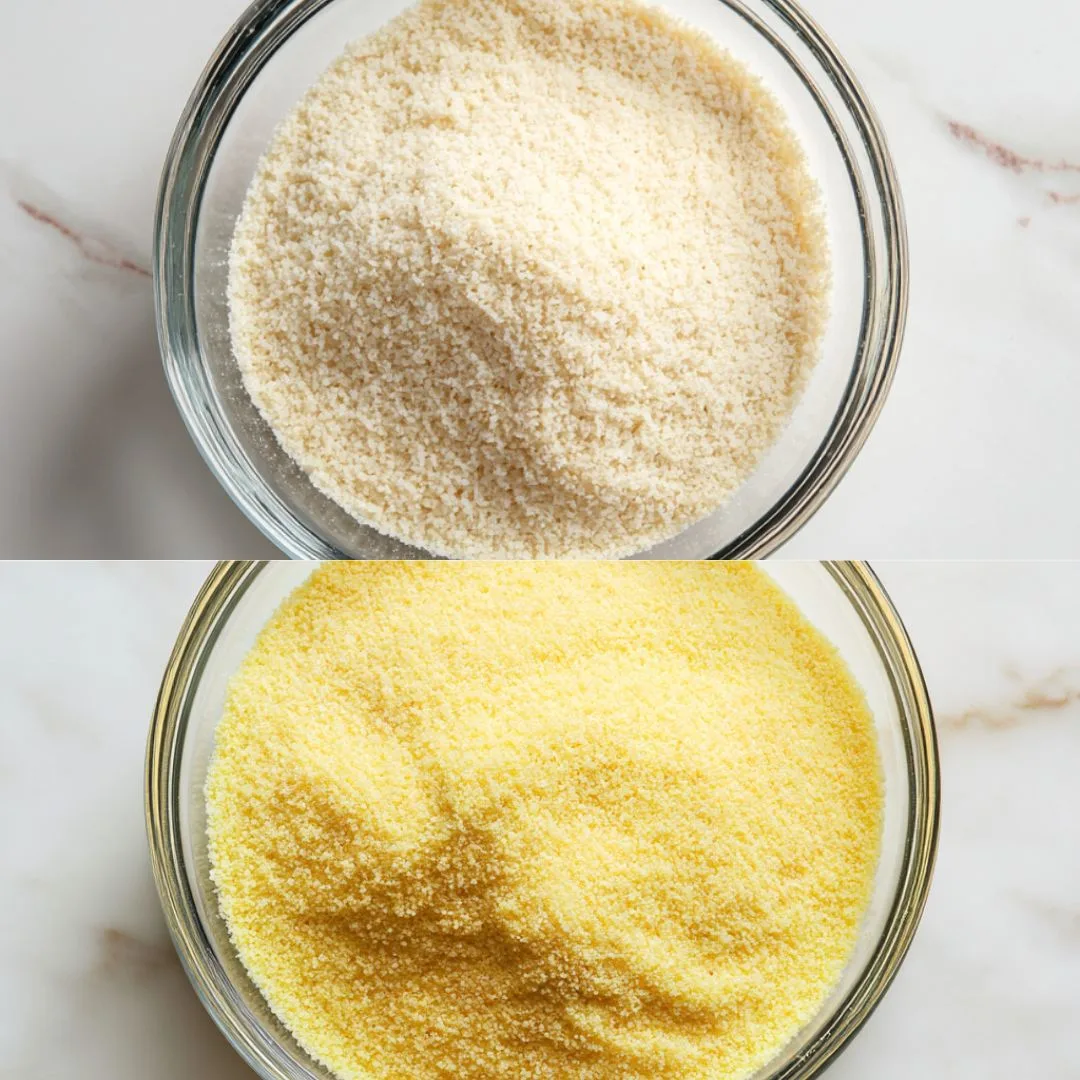Eba is a staple Nigerian food. It is one of those foods that feels like home to me, and it's so easy to make!

Nigerian Eba - A Staple Food
Eba is one of the most common staples in Nigerian homes. It’s what many of us grew up eating, often paired with a flavorful soup like egusi or okra, and eaten with our hands.
I have made Eba many times. It is easy to prepare, but a few tips can make it smoother, softer, and better each time.
If you are making it for the first time or looking to refine your method, this post walks you through the process step by step.

What is eba?
Eba is a dough-like starchy food made by mixing garri (processed cassava granules) with hot water. It belongs to a family of food we refer to as ''swallow food'' because it’s typically swallowed rather than chewed.
Some other foods in this category are pounded yam, fufu, amala, etc. It is not a stand-alone food. It is served alongside hearty soups and stews.
Eba is loved for its simplicity, versatility, and satisfying texture. You can prepare it in just a few minutes.
It is slightly sour and sweet, making it suitable to pair with delicious Nigerian soups like Ogbono soup, Banga Soup, Okro soup, Jute Leaves Soup (Ewedu), Peanut Soup, Egusi Soup, Spinach Stew (Efo Riro), and more.
The soups are accompanied by proteins like beef, Chicken, turkey, goat meat, etc. Its versatility, affordability, and simple preparation make eba an essential component of Nigerian cuisine.

How to Make Smooth And Perfect Eba
- Even Sprinkling: Do not dump all your garri in at once. Sprinkle it gradually in a circular motion to avoid clumping.
- Stirring: As you pour, stir immediately and continuously with a wooden spatula (omorogun) or a sturdy spoon to break up any potential lumps.
- Avoid Cold Water: Cold or lukewarm water results in gummy, uneven Eba. Only hot water ensures proper swelling and even perfect texture.
Cassava
Cassava, the primary ingredient in eba, is a highly resilient root vegetable that thrives in tropical climates.
In Nigeria, cassava is processed into garri through a method that involves peeling, grating, fermenting, and frying. The resulting garri is a granulated, shelf-stable flour that can be easily stored and used for various dishes.

Let's talk about ''swallow foods'' - Okele
Talking about swallows, they are solid meals made from cereals, starchy roots, grains, and vegetables. These food are easily molded into a dough-like consistency and paired with soups. They are usually swallowed instead of chewed. Examples are fufu, amala, pounded yam, and much more.
What is eba made of?
- Garri: is a fine granule cereal made from processed cassava. You can get garri in any African store or grocery.
- Hot water: Must the water be hot? Yes, it has to be hot, boiling water. Using water at room temperature equates to drinking garri. Hot water helps to bind the starch in the cassava flakes to form a dough.

Ingredients You’ll Need
You only need two ingredients:
- Garri (cassava flakes): White or yellow, depending on your preference.
- Hot water: Must be fully boiled (not just warm) to get the right texture.
Optional Tools:
- Wooden spatula (omorogun) or cooking stick
- Pot or Wide bowl for mixing
- Kettle or saucepan
How to make Eba
Eba is one of the easiest swallows to make; You can put it together in under 5 minutes. However, there is no precise measurement for making eba since dryer garri will require more water than less dried ones. My standard ratio is 1 part garri to 2 parts water - 1:2.
If the eba turns out too soft, feel free to add more garri, and if it turns out too hard, you can soften it with more hot boiling water.
Even though the process of making it is simple, it can also be tricky. You don't have to worry; I will share three methods (stovetop, bowl, and microwave) to make soft and smooth eba without lumps in the recipe card at the bottom.
- Step 1: Bring water to a rolling boil.
- Step 2: Add garri evenly to the water till it is absorbed.
- Step 3: Stir with your wooden spatula to your desired texture.
- Step 4: If too soft, add more garri, and if it's too hard, you can add a bit of water.
- Step 5: After this, you can serve it by molding and adding your desired soup.
How to serve Eba
To serve, simply scoop the portion you want and shape it as a roll, then serve it with your favorite soup or stew.
Although nowadays, home cooks and chefs serve eba in different forms and shapes. For example, you can find it shaped like croissants, pinwheels, pyramids, hearts, and so much more.
How to eat eba
Like any other swallow, we cut eba into small edible morsels, dip them in or scoop them with any soup of choice. You will enjoy the sweet and satisfying feel as it slides down your throat.

FAQs
How much garri to water do I need to make eba?
The amount of garri you need depends on the texture of the eba you prefer. Some people prefer it more on the hard side, while others prefer it to be soft. In addition, some garri absorb water more than others because of how they are fermented or processed.
However, I will recommend 1 cup of hot boiling water for ½ cup of garri per serving for first-timers. If it is too soft, you can add more garri. On the other hand, if it is too hard, you can add more water. Feel free to double this recipe if you are serving more people.
Can I eat Eba alone?
No, eba needs to be accompanied by soups, and stews like Ogbono soup, Banga Soup, Okro soup, Jute Leaves Soup (Ewedu), Peanut Soup, Egusi Soup, Spinach Stew (Efo Riro), and more.
Are Eba and garri the same thing?
Friends, if you have followed till this point, you will realize that eba and garri are not the same. While garri is powdery and taken as a cereal, eba is a swallow eaten with other soups. Eba is like a by-product of cassava. The Cassava tuber is fermented and processed into garri, and then the garri is cooked to make eba.
Color
Eba can be yellow or white. It takes on the color of the garri you use. If you use yellow garri, you will get yellow eba. Also, you will eat white eba from white garri.
Both varieties are suitable for making this dish. If you want to know the difference between the yellow and white garri, check here for details.

Different ways to shape Eba
Eba is molded to make it more appealing and presentable. Due to its starchy nature, it can be molded easily into any shape. Molding into a roll doesn't change the taste; it is just a manner of presenting the food on a plate before adding soup. You can shape eba into rolls, pinwheels, pyramids, hearts, or any other creative shape before eating it. By the way, making an eba roll is optional.
Are fufu and eba the same?
Fufu and eba are not the same. It is easy to confuse the two foods because they are both made from cassava (Yuca). However, the process and technique of making them are different. They have different textures, and they taste differently. While fufu has a smooth texture, eba has a rough texture because of the fine granules in garri.

Make ahead and Storage
Eba is best eaten hot or warm, but I know some people also enjoy it cold!
If you wish to make this ahead, you can wrap it in plastic wrap for storage. Wrap and mold it into a circle and store it in an insulated container to keep it warm, or microwave it when you are ready. When ready to eat, remove the wrap and serve with your favorite soup.
More swallows you should try:

How to make Eba
Instructions
How to make Eba on Stovetop
- Bring water to a rolling boil on the stovetop in a small saucepan.
- Turn the heat down to low and add garri evenly to the water in the saucepan and stir with your wooden spatula.
- Ensure that you make the eba to your desired texture by adding the amount of garri the water can take.
- If too soft, add more garri, and if it's too hard, you can add a bit of water.
- After this, you can serve the eba by molding and adding your desired soup.
How to make eba in a bowl
- Boil water in a kettle till it reaches the highest boiling point.
- Transfer the water to a heat-safe bowl.
- Sprinkle garri evenly into the water until the garri is well soaked.
- Use a spoon or spatula to turn it in the bowl.
- If too soft, add more garri, and if it's too hard, you can add a bit of water.
- Serve with any soup of choice.
How to make eba in the Microwave
- Get a microwave-safe bowl, and add garri and water at room temperature.
- Microwave the mixture on high for 5 to 10 minutes or until the mixture comes together.
- Remove from the microwave and use a spoon or wooden spatula to stir together.
- Serve with your desired soup or stew
Nutrition

You can find me on Facebook, and Instagram. I love keeping in touch with all of you! If you make this recipe, I’d love to see pictures of your creations on Instagram or Facebook. #cheflolaskitchen
